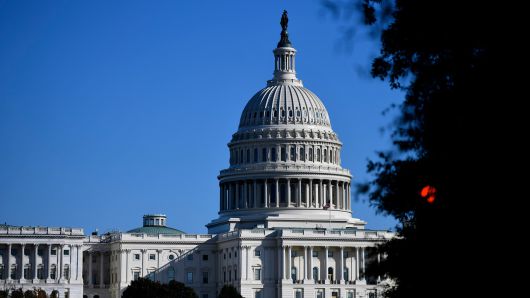
The House passed a sweeping election reform and voting rights bill along party lines on Wednesday in a 220-210 vote.
The For The People Act, better known as H.R. 1 — has been a top priority for Democrats, who argue restoring voters’ faith in the electoral process is more important than ever after former President Trump repeatedly asserted unfounded claims the election was stolen. The Biden administration has strongly advocated for its passage.
“In the wake of an unprecedented assault on our democracy, a never before seen effort to ignore, undermine, and undo the will of the people, and a newly aggressive attack on voting rights taking place right now all across the country, this landmark legislation is urgently needed to protect the right to vote and the integrity of our elections, and to repair and strengthen American democracy,” the White House said in a statement of administrative policy.
The measure would require states to offer mail-in ballots, a minimum of 15 days of early voting and calls for online and same-day voter registration. The legislation also calls for the creation of independent commissions to draw congressional districts in an effort to put an end to partisan gerrymandering. It would also provide additional resources to stave off foreign threats on elections, enable automatic voter registration, and would make Election Day a national holiday for federal workers.
Supporters of the bill said it’s a necessary step to restore faith in the electoral system and tackle dark money in politics, arguing it expands voting rights, increases transparency in elections and creates new ethics rules to tamp down on corruption.
Under the legislation, the Citizens United Supreme Court case, which dissolved certain limits on corporate and union political spending, would be overturned and coordination between super PACs and candidates would be prohibited.
Republicans have blasted the measure as a power grab by Democrats, arguing that the provision allowing for voters to designate a person to return their ballot equates to ballot harvesting and opens the door for election fraud. They have also slammed language allowing felons to vote.
“Second: H.R. 1 would legalize voting for convicted felons all over the country even if they were convicted of election fraud. Does that make sense to you? Not only is this dangerous, it’s unconstitutional,” House Minority Leader Kevin McCarthy (R-Calif.) said in a floor speech on Tuesday.
“Third: H.R. 1 would weaken the security of our elections and make it harder to protect against voter fraud. Here’s how: It would automatically register voters from DMV and other government databases. Voting is a right, not a mandate,” McCarthy said. “In most cases, this legislation would actually prevent officials from removing ineligible voters from the rolls and would make it much more difficult to verify the accuracy of voter information. So future voters might be underage or dead or illegal immigrants or registered two or three times. Democrats just don’t care.”
GOP lawmakers said they believe election reform is an area where parties could work together, accusing Democrats of failing to work across the aisle. The creation of a 6 to 1 federal campaign match on small donations has also been strong sticking point with GOP lawmakers, who argue it’s a misuse of taxpayer dollars.
“So they launder that money, that corporate money that we cannot accept right now into the Treasury and it comes out clean as public money. It’s money that used to be used for things like Crime Victims Funds,” Rep. Rodney Davis (R-Ill.) said on the floor ahead of the vote.
“Instead, this new laundered money, this taxpayer money, because it’s public, it’s under the control of us, then goes out exponentially to all of us, to our campaigns to pay for attack ads, fundraisers, mailers, phone calls, whatever you want. But either way, it’s government spending, government sending corporate dollars directly to us. This is and should be prohibited.”
A version of the bill passed last year, 234-193, without any GOP support and was not taken up in the Senate.
The bill faces a narrow path in the upper chamber, where it is unlikely to garner the 60 votes needed to overcome the filibuster.
Via The Hill
